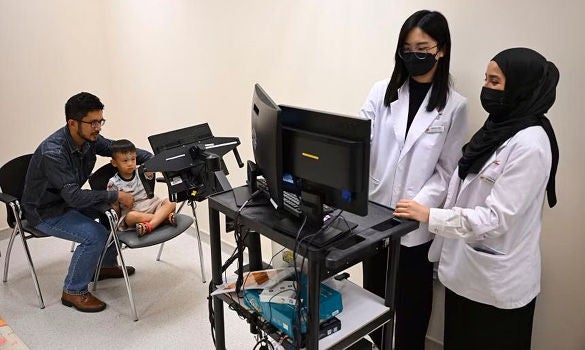
Clinical research coordinators conducting a demonstration of a research study on a child to study the time he takes to react to a stimulus. ST PHOTO: SHINTARO TAY
SINGAPORE - Polyclinic patients will have a say in how studies to improve their care are conducted, with the launch of a research institute by SingHealth Polyclinics that ropes in patient advocates.
The Primary Care Research Institute (PCRI), launched on Tuesday by Senior Minister of State for Health Janil Puthucheary at Punggol Polyclinic, will have a group of 10 to 12 patient advocates who meet researchers regularly to discuss how study protocols can be made easier and more accessible for patients.
The institute said its research will enable clinicians to have a better understanding of patient behaviour and motivations to help them guide patients in managing their health conditions better.
It will have satellite research spaces in Eunos Polyclinic, the upcoming Tampines North and Kaki Bukit polyclinics, and the redeveloped Pasir Ris Polyclinic, said Clinical Associate Professor Tan Ngiap Chuan, director of research and PCRI at SingHealth Polyclinics.
There are around 50 research projects under the institute, ranging from treatment of chronic conditions like diabetes and hypertension to costs involved in using asthma inhalers, said Prof Tan.
Patients invited to be advocates underwent a day’s training on their roles and responsibilities, and how to pinpoint flaws in research methodology.
Housewife Liew Mui Fong, 60, who has been involved in the initiative since September 2020, logs on to a Zoom meeting every three months to discuss the study protocols of at least two or three research projects.
One of these studies was about the psychological needs of mothers who had just given birth. Researchers needed the trial participants to complete a one-hour survey during polyclinic visits.
“From my perspective, when mothers take their babies to the polyclinic, they have to wait for their appointments and they could be tired. So maybe, the researchers should do the question and answer over a Zoom meeting when the mothers are at home,” said Madam Liew.
Prof Tan said the researchers took up her suggestion.
He added that feedback from the patient advocates can sometimes help SingHealth Polyclinics make better use of resources.
One study, for instance, wanted to find new ways to conduct blood pressure monitoring, with patients wearing a measuring device as they moved around in their normal daily lives.
One of the gadgets drew negative feedback from the patient advocates, making it likely that take-up by patients in the study would be poor. “If patient advocates give the feedback that it’s not likely they will use it, then perhaps researchers will want to modify it in a way patients are more receptive to it,” said Prof Tan.
In his speech at the event, Dr Janil said the PCRI is a platform to upskill primary care professionals like family doctors, nurses and allied health professionals, helping them to acquire research skills beyond their clinical practice.
“These professionals will be able to benefit from the PCRI’s workshops and e-learning platforms, which provide updates on evidence-based medicine and research methodology,” he said.
Other institutions carrying out research on family care include the Centre for Primary Health Care Research and Innovation, a joint initiative between Lee Kong Chian School of Medicine and the National Healthcare Group.
The PCRI also signed a memorandum of understanding with pharmaceutical company AstraZeneca and GP+ Co-operative, a cooperative with a network of more than 80 private clinics, to collaborate on how to help patients and their families manage their health conditions better.
Dr Janil said: “As a collaborative platform across polyclinics, private clinics and the industry, the PCRI is set to play an important role in responding quickly to key problem statements in primary care today, and conducting and translating research into concrete, implementable and cost-effective solutions that are needed.
Source: The Straits Times, Singapore Press Holdings Limited. Reproduced with permission.
Contributed by














 Get it on Google Play
Get it on Google Play